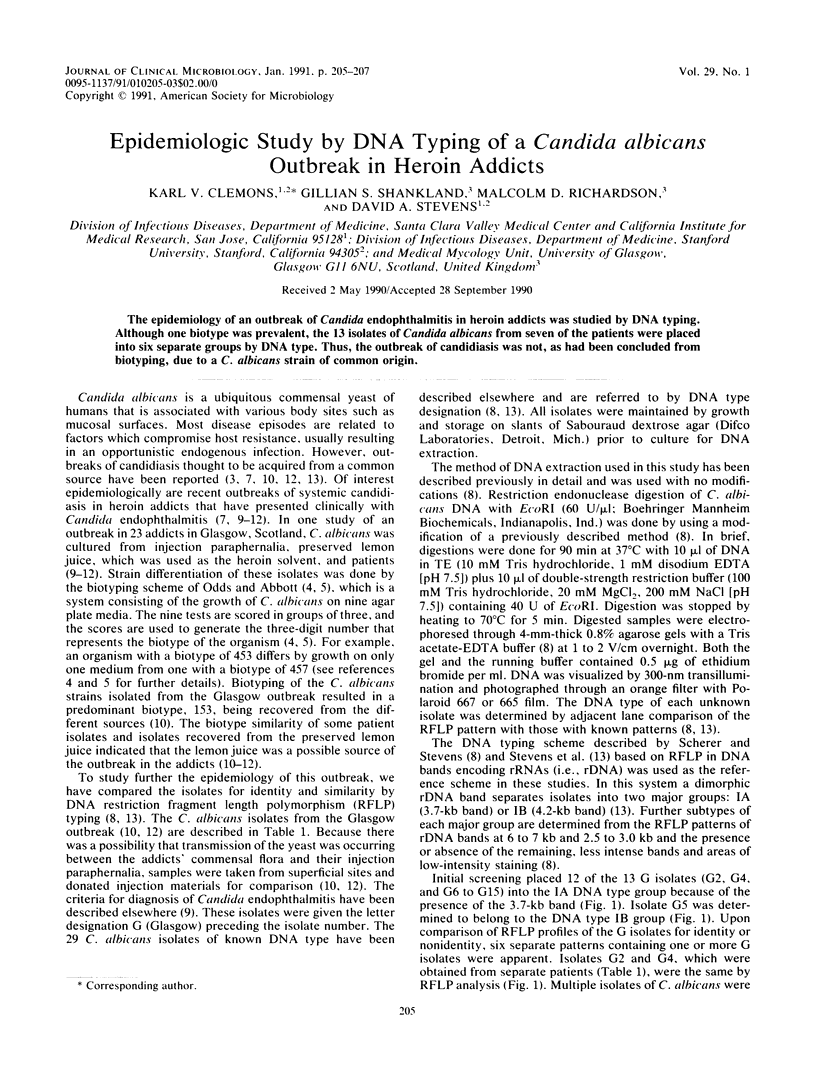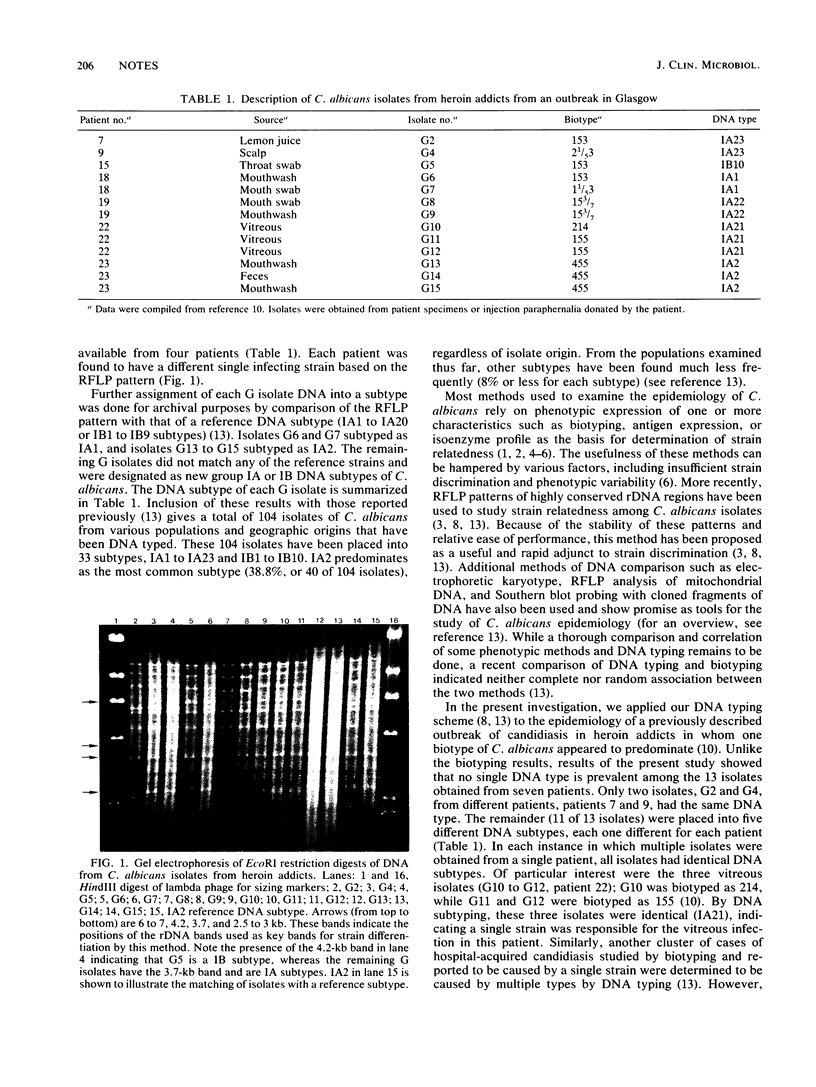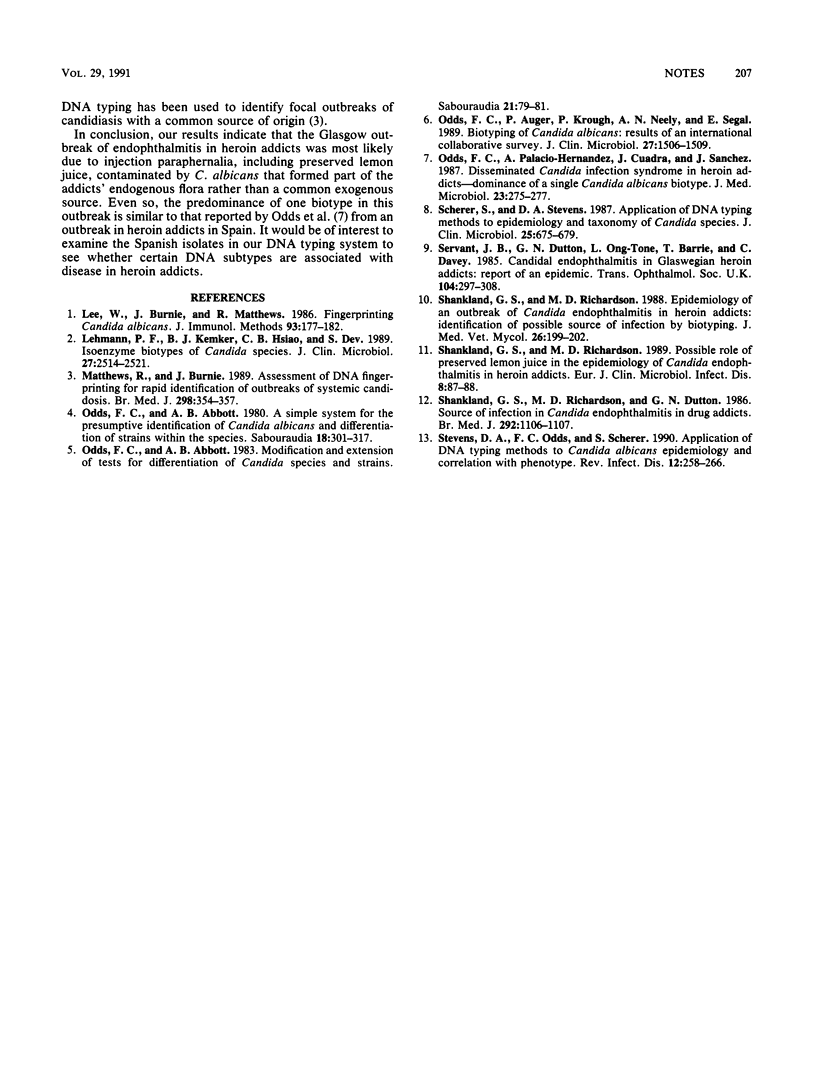Abstract
The epidemiology of an outbreak of Candida endophthalmitis in heroin addicts was studied by DNA typing. Although one biotype was prevalent, the 13 isolates of Candida albicans from seven of the patients were placed into six separate groups by DNA type. Thus, the outbreak of candidiasis was not, as had been concluded from biotyping, due to a C. albicans strain of common origin.
Full text
PDF


Images in this article
Selected References
These references are in PubMed. This may not be the complete list of references from this article.
- Lee W., Burnie J., Matthews R. Fingerprinting Candida albicans. J Immunol Methods. 1986 Nov 6;93(2):177–182. doi: 10.1016/0022-1759(86)90186-9. [DOI] [PubMed] [Google Scholar]
- Lehmann P. F., Kemker B. J., Hsiao C. B., Dev S. Isoenzyme biotypes of Candida species. J Clin Microbiol. 1989 Nov;27(11):2514–2521. doi: 10.1128/jcm.27.11.2514-2521.1989. [DOI] [PMC free article] [PubMed] [Google Scholar]
- Matthews R., Burnie J. Assessment of DNA fingerprinting for rapid identification of outbreaks of systemic candidiasis. BMJ. 1989 Feb 11;298(6670):354–357. doi: 10.1136/bmj.298.6670.354. [DOI] [PMC free article] [PubMed] [Google Scholar]
- Odds F. C., Abbott A. B. A simple system for the presumptive identification of Candida albicans and differentiation of strains within the species. Sabouraudia. 1980 Dec;18(4):301–317. [PubMed] [Google Scholar]
- Odds F. C., Abbott A. B. Modification and extension of tests for differentiation of Candida species and strains. Sabouraudia. 1983 Mar;21(1):79–81. doi: 10.1080/00362178385380111. [DOI] [PubMed] [Google Scholar]
- Odds F. C., Auger P., Krogh P., Neely A. N., Segal E. Biotyping of Candida albicans: results of an international collaborative survey. J Clin Microbiol. 1989 Jul;27(7):1506–1509. doi: 10.1128/jcm.27.7.1506-1509.1989. [DOI] [PMC free article] [PubMed] [Google Scholar]
- Odds F. C., Palacio-Hernanz A., Cuadra J., Sanchéz J. Disseminated Candida infection syndrome in heroin addicts--dominance of a single Candida albicans biotype. J Med Microbiol. 1987 May;23(3):275–277. doi: 10.1099/00222615-23-3-275. [DOI] [PubMed] [Google Scholar]
- Scherer S., Stevens D. A. Application of DNA typing methods to epidemiology and taxonomy of Candida species. J Clin Microbiol. 1987 Apr;25(4):675–679. doi: 10.1128/jcm.25.4.675-679.1987. [DOI] [PMC free article] [PubMed] [Google Scholar]
- Servant J. B., Dutton G. N., Ong-Tone L., Barrie T., Davey C. Candidal endophthalmitis in Glaswegian heroin addicts: report of an epidemic. Trans Ophthalmol Soc U K. 1985;104(Pt 3):297–308. [PubMed] [Google Scholar]
- Shankland G. S., Richardson M. D., Dutton G. N. Source of infection in candida endophthalmitis in drug addicts. Br Med J (Clin Res Ed) 1986 Apr 26;292(6528):1106–1107. doi: 10.1136/bmj.292.6528.1106-a. [DOI] [PMC free article] [PubMed] [Google Scholar]
- Shankland G. S., Richardson M. D. Epidemiology of an outbreak of Candida endophthalmitis in heroin addicts: identification of possible source of infection by biotyping. J Med Vet Mycol. 1988 Jun;26(3):199–202. doi: 10.1080/02681218880000281. [DOI] [PubMed] [Google Scholar]
- Shankland G. S., Richardson M. D. Possible role of preserved lemon juice in the epidemiology of candida endophthalmitis in heroin addicts. Eur J Clin Microbiol Infect Dis. 1989 Jan;8(1):87–89. doi: 10.1007/BF01964128. [DOI] [PubMed] [Google Scholar]
- Stevens D. A., Odds F. C., Scherer S. Application of DNA typing methods to Candida albicans epidemiology and correlations with phenotype. Rev Infect Dis. 1990 Mar-Apr;12(2):258–266. doi: 10.1093/clinids/12.2.258. [DOI] [PubMed] [Google Scholar]



